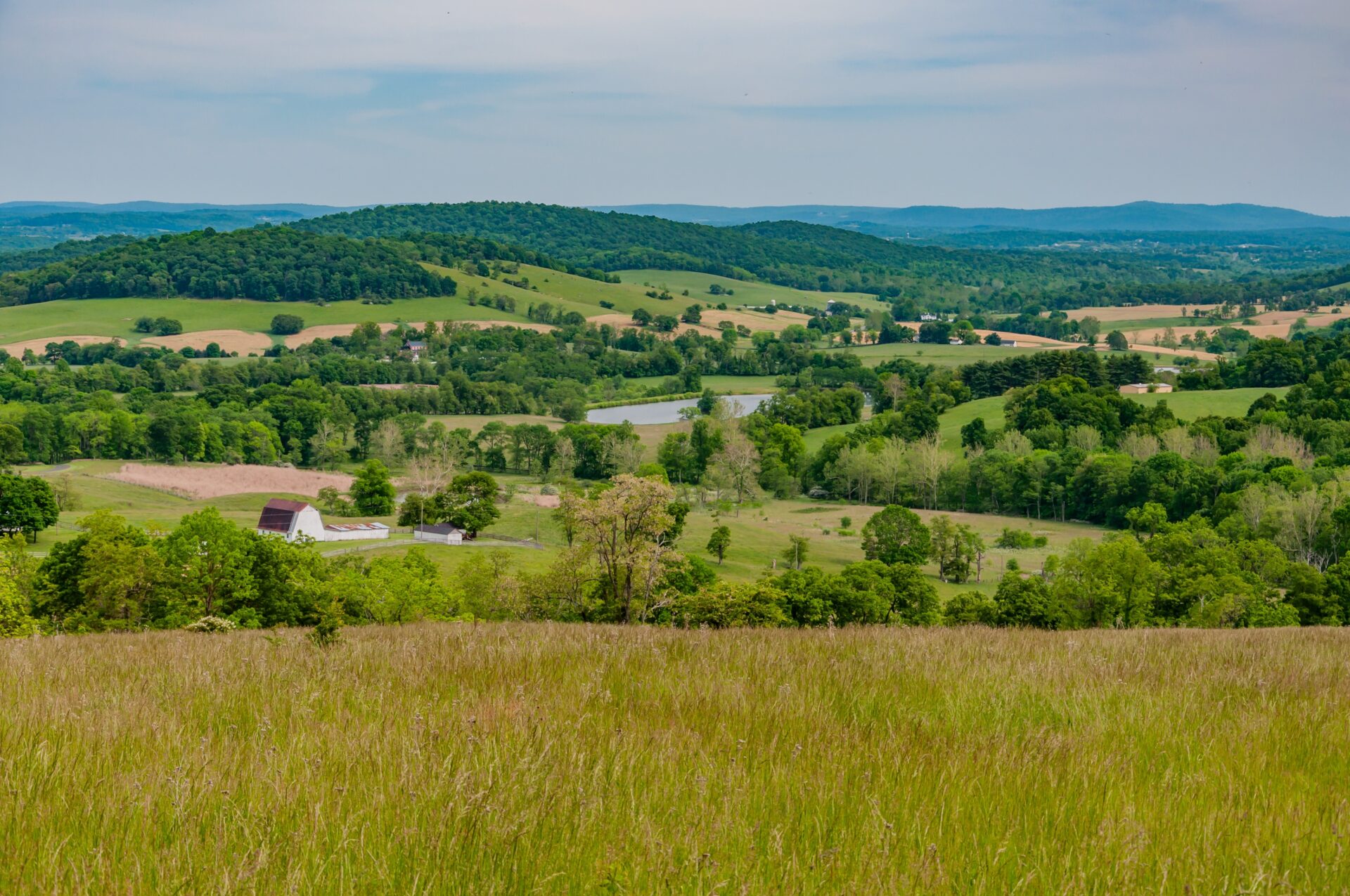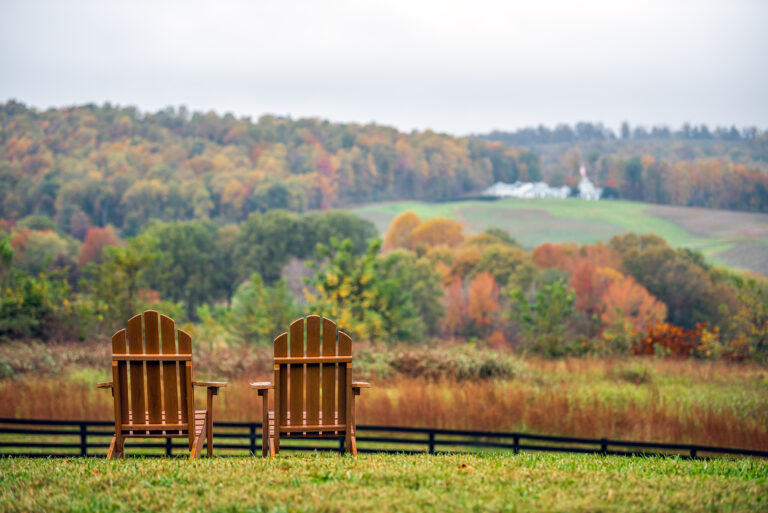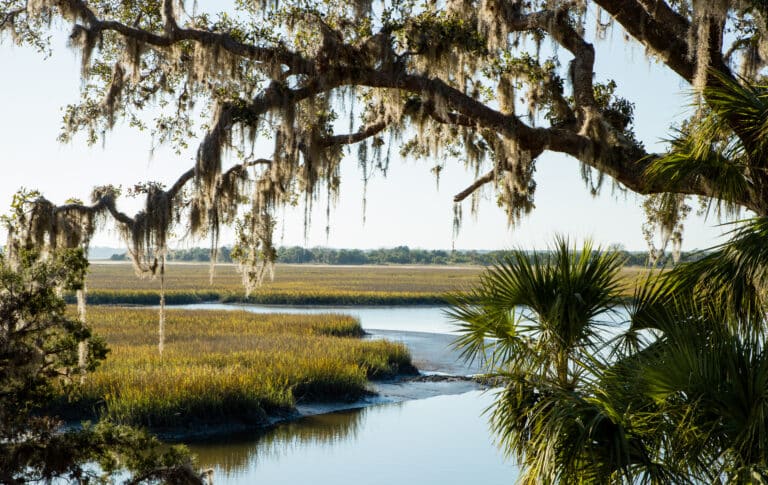There are lots of reasons you may want to buy land in Virginia—the region offers fertile farmland, bustling metro areas, mountainous and coastal retreats, and more. But how do you start the land buying journey?
Whether you’re a first-time buyer or expanding your acreage, the experts at Land.com are here with the ins and outs of buying land in Virginia.
In this comprehensive blog, we’ll cover how to buy land in Virginia for the first time, including key considerations, common pitfalls to avoid, and professional recommendations. No matter what kind of property you’re looking for, we’ll explore the best that Virginia has to offer and how to maximize your investment by aligning your goals with the right parcel.
After reading, you’ll not only understand the process of buying land for sale in Virginia, but you’ll also be one step closer to confidently creating your dream property.
Why Virginia Is a Strong Choice for Land Buyers
With a population over 8.5 million, Virginia is a popular state with lots to offer both new and lifetime residents. It’s a place where you can easily choose between a remote rural property and a bustling urban residence—or both!
Ultimately, here’s why Virginia appeals to landowners:
- Diverse landscapes – Virginia is home to a wide variety of landscapes, including mountains, coastline, farmland, rolling hills, valleys, and forests. This geographical diversity lets land buyers choose acreage that exactly meets their needs.
- Major metro areas – Virginia is the “V” of the DMV metro area. Proximity to Washington, D.C. is a huge draw for many Virginians, whether they commute into the city for work or simply prefer the benefits of living in an urban hub. You can also find other metro areas in-state, such as Richmond, Virginia’s capital.
- Affordability – Virginia is neither the most expensive nor budget-friendly state in the country, but its median household income is higher than the national average, and there are lots of affordable areas to invest in., Inland and rural areas will have lower land prices and costs of living than the DC metro area, for instance.
- Lifestyle value – Since there are so many land types to choose from, Virginia has significant year-round lifestyle appeal. Most of the state has easy access to nature, and its mild four-season climate is perfect for land buyers who enjoy the great outdoors. In addition to outdoor recreation, Virginia is also home to a vibrant historical and cultural scene, which attracts city dwellers and investors alike.
- Long-term stability – All land purchases are an investment in your future. Virginia’s particular position as a growing East Coast state makes it even more of a stable venture.
Now that you know why Virginia is such a strong choice for land buyers, let’s explore all the different potential that Virginia acreage has to offer.
Types of Land Available in Virginia
Thanks to Virginia’s varied geographical and lifestyle appeal, there are lots of land types to consider, no matter what your long-term plans are. Here are some ways to make the most out of Virginia acreage:
- Residential land – Residential property includes move-in ready living spaces, as well as undeveloped plots that are residentially zoned, where you can build a homestead. Residential land can double as another property type, such as a rental investment or recreational getaway.
- Recreational tracts – Recreational land is any land that’s primarily used for outdoor activities. This includes hunting acreage, property for family vacations, or rural escapes with seasonal activities. Virginia offers lots of outdoor fun like hiking, biking, swimming, kayaking, fishing, hunting, skiing, and snowboarding.
- Farmland – Agriculture is Virginia’s largest private industry, with 7.3 million acres of farmland statewide. Another welcoming statistic is that 90% of farms in Virginia are owned by families or individuals. Virginia is also home to a growing wine industry, with over 4,000 acres of vineyards across fertile mountain valleys. Agricultural land buyers can take over existing operations or choose an untouched, fertile plot of their own to get started.
- Timberland – About 16 million acres of Virginia are forested, with over 80% of forest land being privately owned. Timber is a major industry, attracting land buyers who want to tap into the forestry market.
- Mountain properties – Virginia is home to eight mountain ranges, including the iconic Blue Ridge Mountains. Here, land buyers are drawn to recreational land (hiking, skiing), year-round living in quaint mountain towns, getaway properties, and commercial investments like cabin rentals. Outdoor enthusiasts will love the nearby national parks, and any landowner can enjoy the majestic views.
- Coastal retreats – Located along the East Coast, Virginia’s waterfront includes the Chesapeake Bay and the Atlantic Ocean. A particularly charming region is the Eastern Shore, a 70-mile peninsula with fishing villages and remote beaches. Coastal Virginia land buyers will love the small-town charm, seasonal investment opportunities, and water recreation.
Narrowing down your land search is how to buy land in Virginia like a pro.
The Buying Process: What to Expect in Virginia
So, you’re eager to buy land in Virginia and have determined the best type of parcel for your goals. What’s next?
- Make a plan – Sit down and create a clear vision for your property, including a budget, your non-negotiables, potential future expenses, and any resale plans.
- Research listings – Browse land for sale in Virginia to see what the market is like, explore typical acreage in your budget, and get a feel for different regions.
- Find a local agent – Working with a local real estate professional is one of the best ways to ensure a successful purchase. Connect with a Land Pro in Virginia to streamline the process from start to finish.
- Conduct land surveys – Before committing to a property, it’s important to understand every facet of the land, as well as its exact boundaries. We recommend hiring a professional land surveyor for this task.
- Secure financing – It’s okay if you can’t pay out of pocket—there are several financing methods available for land purchases in Virginia. The most common option is getting a mortgage from a local bank or credit union. In some cases, land is available with seller financing, in which the seller provides the loan and the buyer pays over time. Both parties negotiate terms like the down payment, interest, and payback period, making this option more flexible than traditional lenders. In Virginia, rural land buyers also qualify for USDA land loans specifically for buying and maintaining agricultural acreage.
- Close the deal – Once you’ve conducted a title search, land inspection, and other due diligence, it’s time to sign on the dotted line. A land professional can help with all the paperwork leading up to the closing meeting. After the deed is transferred, you’re officially a Virginia landowner!
Before you get started, let’s also review some state-specific tips for buying land in Virginia.
Understanding Land Use and Regulations
It’s important to conduct research for any land purchase, especially in a place like Virginia with such diverse terrain. Be sure to evaluate:
- Zoning laws – Zoning and land use regulations determine how you’re allowed to use your property. For instance, if an undeveloped parcel isn’t residentially zoned, you can’t build a home on it. Due to environmental protections, there may also be additional regulations, such as building structures far enough from the shoreline.
- Land conservation programs – In Virginia, landowners can take advantage of extensive federal tax benefits thanks to conservation easement incentives. Through these programs, qualified conservation contributions are counted as charitable gifts, giving landowners an income tax deduction. Additionally, landowners can receive an estate tax exclusion up to 40% of the land value for donated land or conservation easements.
- Property taxes – In Virginia, both property taxes and real estate taxes are locally determined, and rates can change from county to county.
Having a clear picture before buying ensures your budget and goals stay on track.
Common Mistakes to Avoid When Buying Land in Virginia
Throughout a land journey, staying prepared helps buyers avoid typical pitfalls. Here’s what you need to know:
- Don’t underestimate infrastructure needs – Make sure utilities are either in place or able to be installed.
- Don’t overlook environmental restrictions – Research local protections to ensure your plans are possible.
- Don’t ignore long-term accessibility – You’ll need an access road to actually enjoy your property, and it must be usable in all elements and seasons.
If you have questions to ask when buying land in Virginia, local professionals can provide the best on-the-ground insight.
How to Align Your Goals With Your Land Purchase
The best type of land in Virginia meets your needs, lifestyle, and long-term plans. After all, an agricultural buyer won’t have the same priorities as a family in the suburbs, an investor on the coast, or an off-grid backpacker.
Remember: Your goals will shape your decision. Clarify your vision up front to avoid headaches down the line.
Next Steps: Making Your Virginia Land Work for You
Once you’ve purchased acreage, it’s time to bring your plans to life. With the proper planning and support, buying land in Virginia is both a rewarding lifestyle choice and a smart long-term investment.
Whether you’re drawn to the Blue Ridge Mountains, the rolling farmlands of central Virginia, or the scenic Chesapeake Bay coast, there are countless opportunities waiting for you. Start browsing land in Virginia for sale on Land.com, the nation’s leading online marketplace for rural real estate, and explore some of the best places to buy land in Virginia based on your goals and vision for the future.
Looking for more information to help you navigate your search? Check out Land News for more expert insight, or connect with a Virginia Land Specialist to make your dreams a reality.
Sources:
United States Census Bureau. Virginia. https://data.census.gov/profile/Virginia?g=040XX00US51.
Virginia Museum of History and Culture. What Are the Five Physical Regions of Virginia’s Geography? https://virginiahistory.org/learn/what-are-five-physical-regions-virginias-geography.
US News & World Report. Affordability. https://www.usnews.com/news/best-states/rankings/opportunity/affordability.
Virginia Farm Bureau. Virginia Farm Bureau Agriculture Facts. https://www.vafb.com/membership-at-work/agriculture/agriculture-facts.
Virginia Wine. The Story of Virginia Wine. https://www.virginiawine.org/about.
Virginia Department of Forestry. Forest Resource Information. https://dof.virginia.gov/forest-utilization-sustainability/forest-inventory/forest-resource-information/.
Virginia Tourism Corporation. Virginia Mountains. https://www.virginia.org/things-to-do/outdoors/mountains/.
Virginia Tourism Corporation. Virginia’s Eastern Shore. https://www.virginia.org/places-to-visit/regions/eastern-shore/.
Investopedia. Land Loans: Everything You Need To Know. https://www.investopedia.com/articles/credit-loans-mortgages/090716/land-loans-3-things-know-you-buy-land.asp.
Virginia Department of Conservation and Recreation. Enjoying Financial Incentives. https://www.dcr.virginia.gov/land-conservation/financial-incentives.
Virginia Department of Taxation. Property Tax and Real Estate Tax Questions. https://www.tax.virginia.gov/property-tax-and-real-estate-tax-questions.



